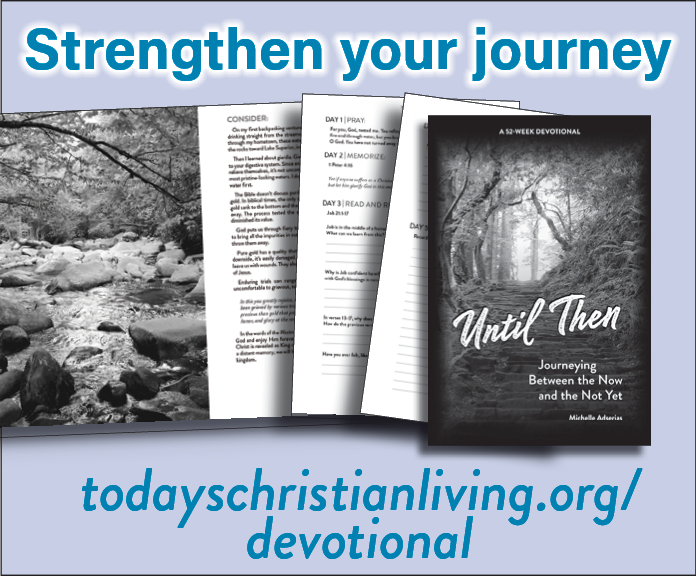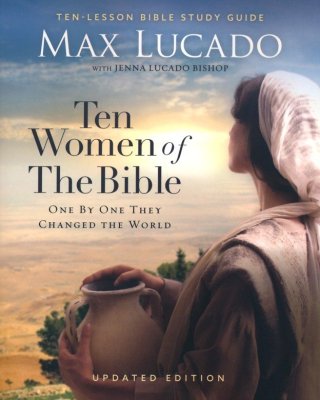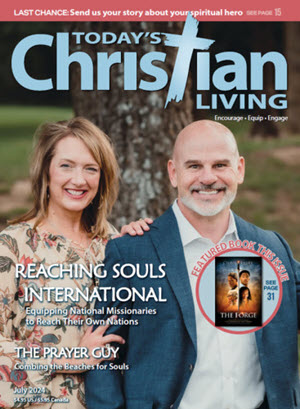God Wrote a New Story in Mary DeMuth’s Life. Now She’s Helping Others Become “Restoried” Too.
By Stephanie Rische
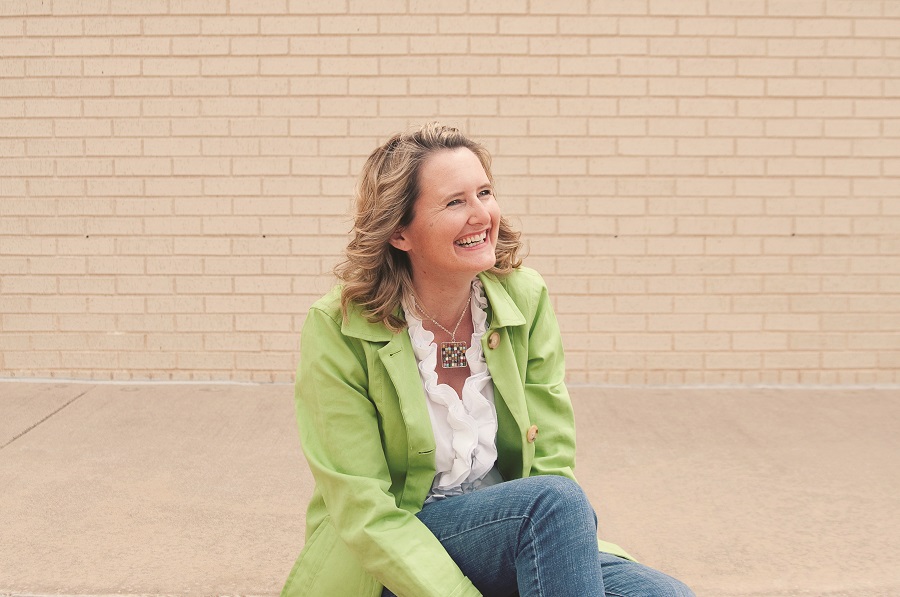
Author. Speaker. Podcaster. Mentor. Wife. Mother. These are all titles that describe Mary DeMuth. With more than 40 books to her name and an international speaking career, Mary would be considered a success by any measure. But that’s not how her story started. As a teenager, the words she would have used to describe herself were a far cry from success: Victim. Outcast. Hopeless. Unworthy. Betrayed.
For Mary DeMuth, redemption is not just an abstract biblical concept; it’s the very theme of her life. She is living proof that God can write a new story with our broken pieces, and she has devoted herself to sharing this message of hope with people around the world. She calls her website “Restory,” a nod to the idea that God delights in healing us and giving us a new, redeemed story. “The old is gone,” she said. “The new awaits!”
Over the past three decades, Mary hasn’t wavered from her solitary passion: to see people experience freedom from pain. “What I love most is helping people walk through past pain and trauma with Jesus,” she said. “It’s a joy to know God can use my words to help set people free.”
A Childhood Marked by Trauma
Mary’s life was marked by trauma from a young age. When she was just 5 years old, she was sexually abused by two older neighbor boys. They threatened to kill her parents if she told anyone, so she bore this awful secret throughout her childhood. Then, at the age of 10, her biological father died. Her mother had remarried twice, and her home life was marked by instability, grief, and broken relationships. When she was in junior high, tears were her constant companion, and she contemplated killing herself.
During her freshman year of high school, at a time when she had no reason to hope, she was invited to a Young Life event. “Every time the speaker said ‘Jesus,’” my heart pounded,” Mary said. At the end of one of the talks, the speaker quoted Matthew 8:27: “What kind of man is this, that even the winds and the sea obey him?” Throughout the summer, Mary couldn’t get that question out of her mind.
The fall of her sophomore year, she went to a weekend camp with Young Life. It was there that she heard the gospel message in its entirety and committed her life to Jesus. “I sat under an evergreen tree that evening and looked up into the star-pocked night, searching for the face of God,” she said. “In that moment, I gave Him my heart, my life, my past, my pain, my tears, and my wounds. I surrendered myself to the God who had conquered death, the Father who would never leave me.”
A Gradual Process of Healing
While Mary gave her heart to Jesus in a single moment, healing didn’t happen overnight. “There’s this perception that healing should be an instantaneous thing,” Mary said. “Unfortunately, the church often does poorly with trauma. Even with good motives, church leaders may minimize trauma or put pressure on the victim. Many people don’t know how to treat those with adverse childhood experiences, and this can lead to blaming the victim.”
Some Christians assume that once you’ve been prayed for, you should be automatically healed. There’s the implication that if you’re not “over it,” it’s your fault because you’re not thinking correctly. While it’s true that Jesus can bring immediate healing, more often the road to wholeness takes place over the span of years. “Sanctification is a lifetime journey, a series of small obediences over the long haul,” Mary explained. “So why would we expect healing to be any different?”
Mary credits the church for helping her with her own process of healing. “When I was a teenager, I was surrounded by Christian leaders who prayed for me and showed me great kindness,” Mary said. “They didn’t judge me. They didn’t say, ‘That didn’t happen.’ They just listened and empathized and wept alongside me.”
An Unexpected Career of Sharing Hope
If someone had told that suicidal teenager she would one day be writing and speaking words of hope for others, Mary would have been the first to object. “I didn’t always know I would be a writer,” she said. “When I was in second grade, I had a teacher who said something that stuck with me for decades. This teacher’s word rang so clear in the midst of my rough childhood: ‘Mary can write.’” Mary majored in English in college and taught English to secondary students, so there were hints about her future career, but writing was never something she pursued.
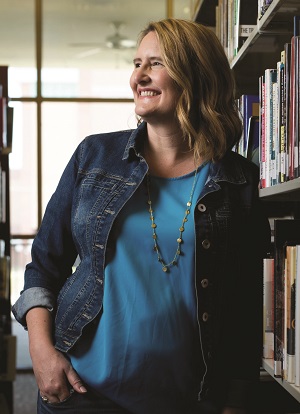
Then, in 1992, she had her first child. “That child came out, and I suddenly wanted to write a book!” Mary said with a laugh. “I began writing, and I spent a decade just writing for myself. This was before blogging, so I had no way to get my words out. I just worked on the craft, and when my kids were old enough, I found myself in a place to dust off the dream. My publishing journey started in 2002 — a decade after I started writing.” Mary believes that period of obscurity forced her to hone her craft without worrying about other people’s reactions. “People often wonder how I was able to persevere so long without getting anything published, but I’m actually grateful for that time.”
A Calling to Speak Truth to the Church
Mary and her husband, Patrick, are officially empty nesters now, which means she is entering a new phase of life and ministry. They’re still involved in their children’s lives, of course, but their roles have shifted. “One of the things I’ve been thinking about lately is that there aren’t a lot of parenting manuals for how to parent adult children,” Mary said. “I think it’s because the previous generation of parents didn’t really do that. I find myself coaching my adult children more than I expected to. My kids want that — we have a relationship like that. I love adult-coaching them, even as this is new territory.”
Meanwhile, Mary’s writing seems to be experiencing its own coming of age. With the climate of the “me too” movement, spaces have opened up to talk about subjects Mary has been wanting to discuss for decades. “I’ve been telling my story since the ’90s,” she said. “But often I’ve told it to the sound of crickets. Now there’s an openness to be able to talk about abuse.”
With her background, Mary offers the unique perspective of someone who has been wounded deeply but also has a deep love for the church. “A lot of my healing has come from the church,” she said. “I don’t have a vendetta against the church.” In 2019, she released a book called We Too: How the Church Can Respond Redemptively to the Sexual Abuse Crisis. “I wrote this book because there are lots of instances where the church hasn’t gotten it right, where it hasn’t been the hands and feet of Jesus. The book comes from a combination of my love for the church and my desire to see her do better.”
Mary admits that she sometimes has to fight cynicism when she hears story after story about abuse within the church. “Honestly, the past year has been the most tempting time to lose hope. I’ve seen a lot of ugly this year,” she said. “That’s when I just have to go back to Jesus. I have to go back to finding Jesus in the middle of the situation, in the middle of the darkness.”
Mary is also grounded in her home church, Lake Pointe Church in North Texas, where she serves with her husband. “When I find myself feeling weary or cynical, I return to my small community, where people love me and I love them. In those spaces, I’m so wonderfully cared for. That’s where the church is the church, where people bring you dinner when you’re sick.” She knows that even with its flaws, the church is still God’s answer to redeem the world. “I don’t want to throw out all the bad things, because that would mean throwing out the good things too.”
This quote of Carl Bard’s from Mary’s website speaks to the way God can “restory” us: “Though no one can go back and make a brand-new start, anyone can start from now and make a brand-new ending.”
MARY”S ADVICE
For those struggling to forgive
First, I would say be kindhearted to yourself. If you had a friend who was struggling to forgive, you would extend grace to them — you would be gentle to them. So be gentle to yourself, too. Also, don’t attach a label to your struggle. Don’t say, “I haven’t forgiven, so I must not be a Christian.” The forgiveness journey is layered, not “one and done.” Some people declare that they forgave on a certain date, but then they have a flashback or experience a trigger, and they wonder if they’ve really forgiven. Forgiveness is a process; it’s multifaceted. Nobody else gets to prescribe your forgiveness journey. God is making you into a new creation, and this process requires patience. “This means that anyone who belongs to Christ has become a new person. The old life is gone; a new life has begun!” (2 Cor. 5:17, NLT).
For church leaders and friends of victims
I would say first, listen. What most people need is someone to be there for them. If it’s appropriate, offer to pray — and do so in the moment. Don’t just say “I’ll pray for you.” Offer to pray right then. I have a “Sexual Abuse Resource List” available on wetoo.org/pastors. It’s a free 30-page PDF with information about counseling, websites, and resources to help someone dealing with the aftermath of abuse.
Stephanie Rische edits and writes in the Chicago area, where she lives with her husband and son. When she isn’t chasing down commas or a toddler, she blogs at stephanierische.com. Her memoir, I Was Blind (Dating), but Now I See, recounts how God surprised her with his grace and love.


